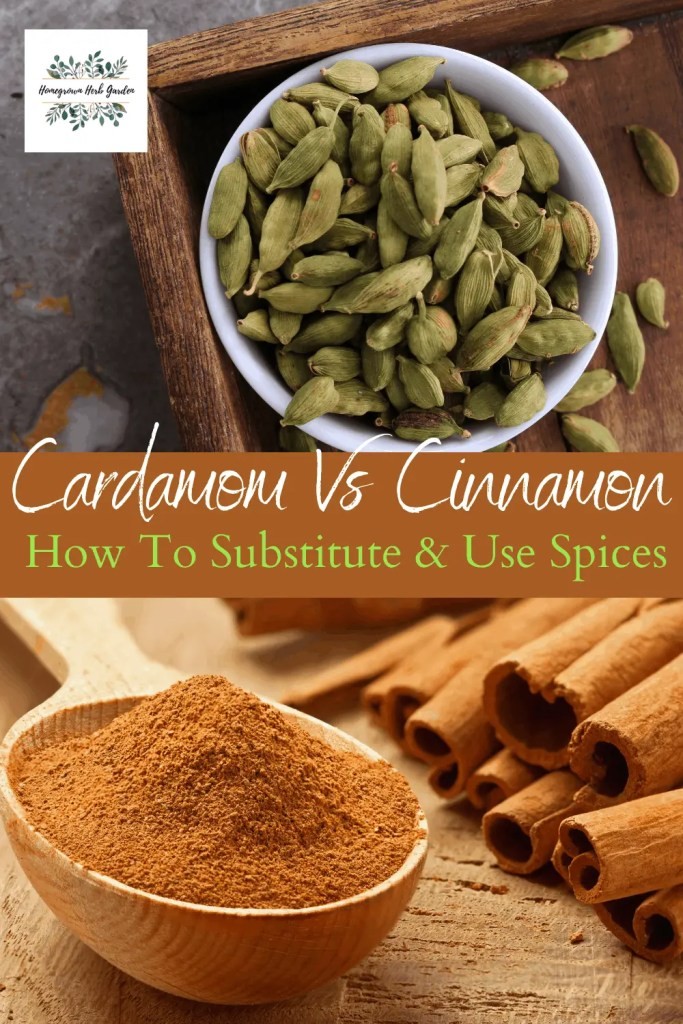
Contents
Cardamom vs. Cinnamon: Which is Healthier?
Cardamom and cinnamon are spices with nutritive and protective properties that offer health benefits. However, cinnamon may have an edge over cardamom.
Both cardamom and cinnamon are popular spices used in cuisines worldwide. They both have nutritive and protective properties that offer health benefits. But what is the difference between these two spices, and which one is healthier?
Cardamom, also known as the "queen of spices," is a small seed that grows in a pod. It is grown in South India, Sri Lanka, Southeast Asia, and Central America. It is used to flavor a variety of dishes and beverages. Cardamom has a strong and sweet flavor with a citrusy, minty, and floral fragrance.
Cardamom’s Nutritional Value
One teaspoon or 2 grams of cardamom contains:
- 6.22 calories
- 0.216 grams of protein
- 0.134 grams of fat
- 1.37 grams carbohydrates
- 0.56 grams of fiber
- 7.66 milligrams of calcium
- 4.58 milligrams of magnesium
- 3.56 milligrams of phosphorus
- 22.4 milligrams of potassium
It also contains various vitamins such as vitamin C, B1, B2, B3, B6, and B12, as well as minerals like iron, sodium, zinc, copper, and manganese.
Cardamom’s Health Benefits
In traditional medicine, cardamom has been used to relieve digestive problems and obesity. It is also known for its anti-inflammatory and antimicrobial properties.
Some health benefits of cardamom include:
Antioxidant properties: Cardamom contains natural antioxidants that protect cells from oxidative damage caused by free radicals.
Heart-health and anti-inflammatory properties: Cardamom’s anti-inflammatory components can help prevent heart problems and diabetes.
Anti-cancer effects: Cardamom’s antioxidant and anti-inflammatory properties may prevent the growth of cancer cells.
Improves good cholesterol: Cardamom extract has been shown to improve good cholesterol levels and protect the liver.
Protects the digestive system: Cardamom can protect the digestive system from gastric ulcers and promote healing.
Neuroprotective effects: Cardamom’s extract has shown protective effects on brain cells, which may help prevent Alzheimer’s disease.
What is Cinnamon?
Cinnamon is a widely recognized spice made from the dried bark of certain plants. It is grown in Sri Lanka, Indonesia, Vietnam, and China. Cinnamon adds a warm, woody, and sweet flavor to various dishes and beverages, mainly due to an oil called cinnamaldehyde.
The Nutritional Value of Cinnamon
One teaspoon or 2.6 grams of cinnamon contains:
- 6.42 calories
- 0.104 grams of protein
- 0.032 grams of fat
- 2.1 grams of carbohydrates
- 0.056 grams of sugar
- 1.38 grams of fiber
- 26 milligrams of calcium
- 11.2 milligrams of potassium
Cinnamon also contains vitamins E and K, and minerals like magnesium and phosphorus.
Cinnamon’s Health Benefits
Cinnamon offers antioxidant, antimicrobial, and anti-diabetic effects.
Some health benefits of cinnamon include:
Antioxidant and anti-inflammatory properties: Cinnamon’s natural antioxidants protect cells from damage and prevent inflammation.
Antimicrobial properties: Cinnamon has antibacterial and antifungal properties, making it effective against oral microbes.
Anti-cancer properties: Cinnamon extract may protect against blood cancers and inhibit the growth of cancer cells.
Controls diabetes: Cinnamon can help lower blood glucose and fat levels, making it beneficial for those with diabetes.
Improves digestive function: Cinnamon protects the digestive tract lining and reduces inflammation.
Boosts brain function: Cinnamon enhances the brain’s ability to use glucose and may improve cognitive function.
What is the difference between cardamom vs. cinnamon?
Cardamom and cinnamon are both flavorful and nutritious. However, there are some differences that can help you decide which one is better for you.
Availability and cost: Cardamom is more expensive than cinnamon.
Nutritional value: Cardamom has more fats and proteins, while cinnamon has more carbohydrates and fiber.
Health benefits: Cinnamon has higher levels of antioxidants and appears to be more effective in reducing lipase levels, a key enzyme that can lead to diabetes and heart problems.
If you are at risk of developing type 2 diabetes, cinnamon may be a better and more affordable option for you.
Other Considerations
Although both cardamom and cinnamon are tasty and nutritious, it is important to consume them in moderation. Large amounts may lead to allergies or toxicity. If you have an allergy to cinnamon or cardamom, consult your doctor for suitable substitutes.
Sources:
- Annals of Family Medicine
- Biomedicine & Pharmacotherapy
- Diabetes Research and Clinical Practice
- European Journal of Medicinal Chemistry
- Evidence-Based Complementary and Alternative Medicine
- Food and Nutrition Sciences
- Frontiers in Nutrition
- Journal of Diabetes & Metabolic Disorders
- Journal of Ethnopharmacology
- Journal of Medicinal Food
- Lipids in Health and Disease
- Molecular Nutrition & Food Research
- Molecules
- Neuromolecular Medicine
- Nutrition Today
- Pharmacognosy Research
- The British Journal of Nutrition
- USDA


